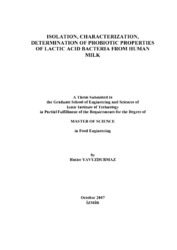Please use this identifier to cite or link to this item:
https://hdl.handle.net/11147/3941Full metadata record
| DC Field | Value | Language |
|---|---|---|
| dc.contributor.advisor | Harsa, Şebnem | en |
| dc.contributor.author | Yavuzdurmaz, Hatice | - |
| dc.date.accessioned | 2014-07-22T13:52:47Z | - |
| dc.date.available | 2014-07-22T13:52:47Z | - |
| dc.date.issued | 2007 | en |
| dc.identifier.uri | http://hdl.handle.net/11147/3941 | - |
| dc.description | Thesis (Master)--Izmir Institute of Technology, Food Engineering, Izmir, 2007 | en |
| dc.description | Includes bibliographical references (leaves: 66-72) | en |
| dc.description | Text in English; Abstract: Turkish and English | en |
| dc.description | xi, 69 leaves | en |
| dc.description.abstract | Probiotics mean live microorganisms that have beneficial effects on their host.s health. Although probiotic strains can be isolated from many sources; for human applications the main criteria is being human origin.Breast milk is an important nutrient source for neonates. Lots of studies showed that this fluid has beneficial effects on the health of neonates. One reason of being beneficial is explaining by the microflora of human breast milk including beneficial lactic acid bacteria.In this study, isolates were identified by biochemical and molecular characterization and also probiotic properties of lactic acid bacteria, isolated from human milk were investigated.Three of the isolates were observed as potential probiotic. Two of them are bacilli and the other is cocci. These isolates showed resistance to stomach pH (pH 3,0), tolerance against 0,3% bile concentration and antimicrobial activity against Salmonella thyphimurium CCM 5445, Escherichia coli O157:H7 NCTC 129000 and Escherichia coli NRRL B-3008. After investigation the probiotic properties of these isolates, they were identified by biochemical characterization techniques and molecular identification by using amplification and restriction fragment length polymorphism (RFLP) of 16S ribosomal DNA (rDNA) and 16S sequencing. Two lactobacilli were identified as Lactobacillus oris and Lactobacillus fermentum. In the light of this study, it is observed that, human milk is a source of potential probiotic strains. | en |
| dc.language.iso | en | en_US |
| dc.publisher | Izmir Institute of Technology | en |
| dc.rights | info:eu-repo/semantics/openAccess | en_US |
| dc.subject.lcc | QR121. Y35 2007 | en |
| dc.subject.lcsh | Lactic acid bacteria | en |
| dc.subject.lcsh | Breast milk | en |
| dc.subject.lcsh | Probiotics | en |
| dc.title | Isolation, characterization, determination of probiotic properties of lactic acid bacteria from human milk | en_US |
| dc.type | Master Thesis | en_US |
| dc.institutionauthor | Yavuzdurmaz, Hatice | - |
| dc.department | Thesis (Master)--İzmir Institute of Technology, Food Engineering | en_US |
| dc.relation.publicationcategory | Tez | en_US |
| item.fulltext | With Fulltext | - |
| item.grantfulltext | open | - |
| item.languageiso639-1 | en | - |
| item.openairecristype | http://purl.org/coar/resource_type/c_18cf | - |
| item.cerifentitytype | Publications | - |
| item.openairetype | Master Thesis | - |
| Appears in Collections: | Master Degree / Yüksek Lisans Tezleri | |
Files in This Item:
| File | Description | Size | Format | |
|---|---|---|---|---|
| T000712.pdf | MasterThesis | 942.66 kB | Adobe PDF |  View/Open |
CORE Recommender
Page view(s)
718
checked on Nov 18, 2024
Download(s)
550
checked on Nov 18, 2024
Google ScholarTM
Check
Items in GCRIS Repository are protected by copyright, with all rights reserved, unless otherwise indicated.